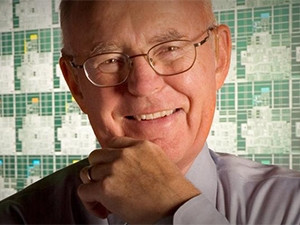
This week, the ICT industry celebrates the 50th anniversary of the law that became the "golden rule" for the electronics industry, as Moore's Law turned 50 on Saturday.
Intel notes Gordon Moore predicted, in 1965, that computing would dramatically increase in power, and decrease in relative cost, at an exponential pace. This, says the computing company, "set the pace for our modern digital revolution".
Moore's Law went on to become the "golden rule for the electronics industry, and a springboard for innovation," says Intel of its co-founder's prediction. This rule, it adds, "paved the path for Intel to make the ever faster, smaller, more affordable transistors that drive our modern tools and toys. Even 50 years later, the lasting impact and benefits are felt in many ways."
Among the benefits Intel cites are economic impact as costs came down, technology as computing became more pervasive, and societal impact as computing changed the way users interact.
"Like a metronome of the modern world, for 50 years Gordon's prediction has set the pace for innovation and development. This foresight laid a fertile foundation from which all modern technology could spring, including the broad rise of digitisation and personal electronics."
Intel adds Moore's Law and related innovations are shifting toward the seamless integration of computing within daily lives.
Moore observed, over the history of computing hardware, the number of transistors in a dense integrated circuit doubled about every two years. Initially, this prediction was for a doubling in computing power every year, later revised - in 1975 - to a doubling every two years.
However, Moore has predicted the law will not hold true forever. In a recent interview he stated: "I guess I see Moore's Law dying here in the next decade or so, but that's not surprising."
Moore was commenting on the rate of progress in chip innovations slowing down.
Share